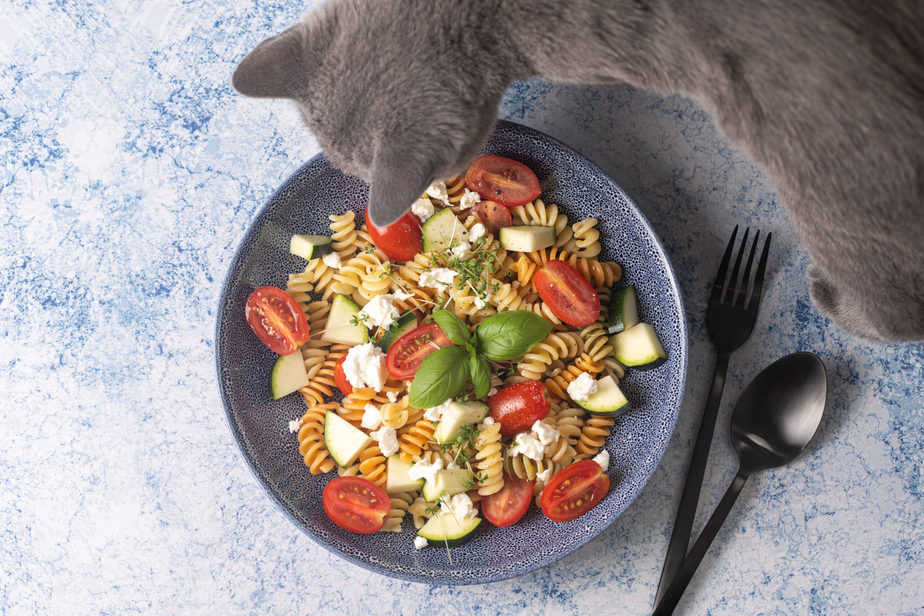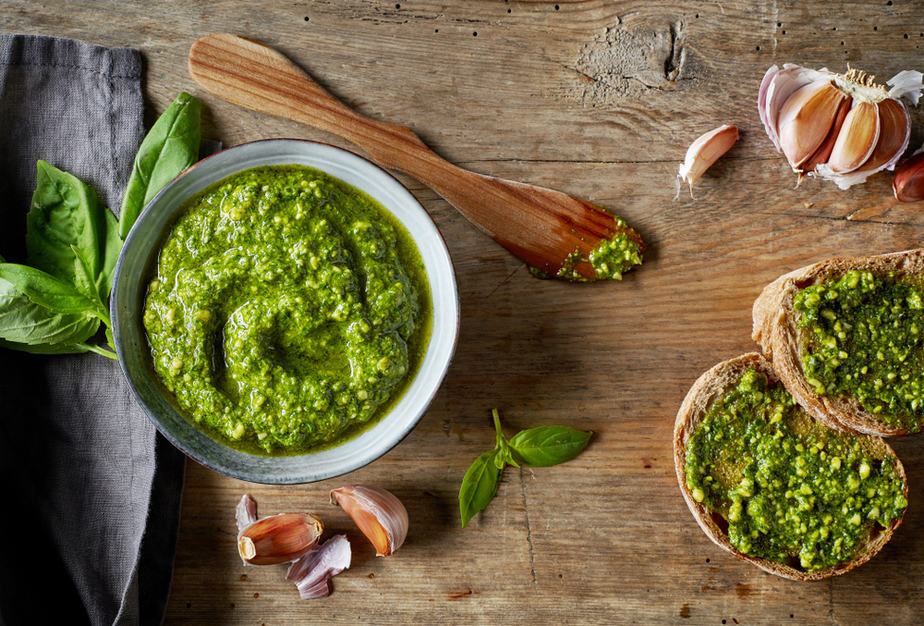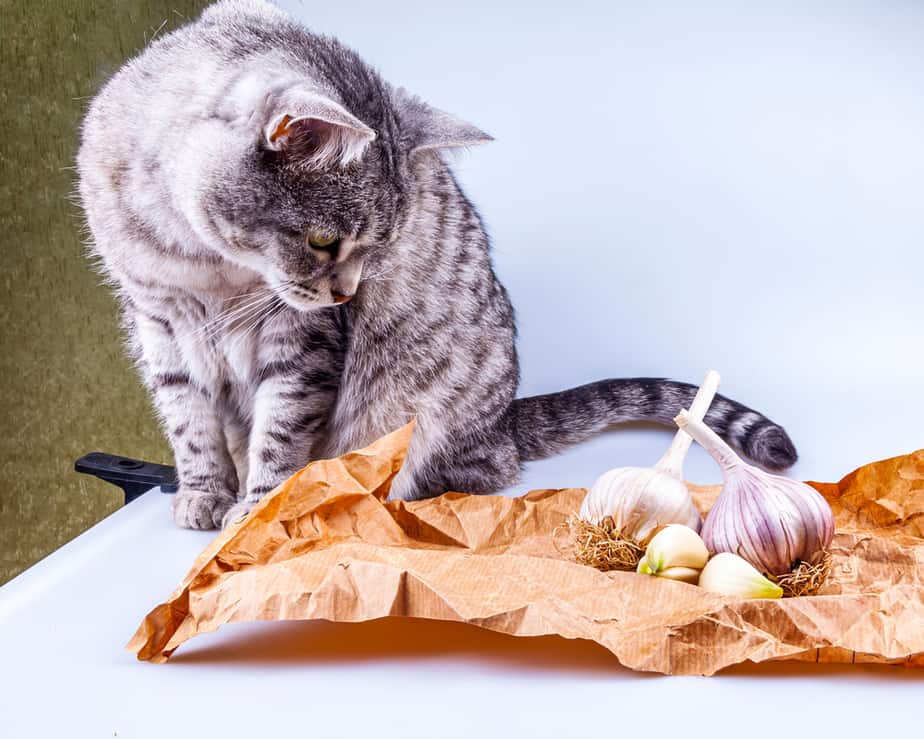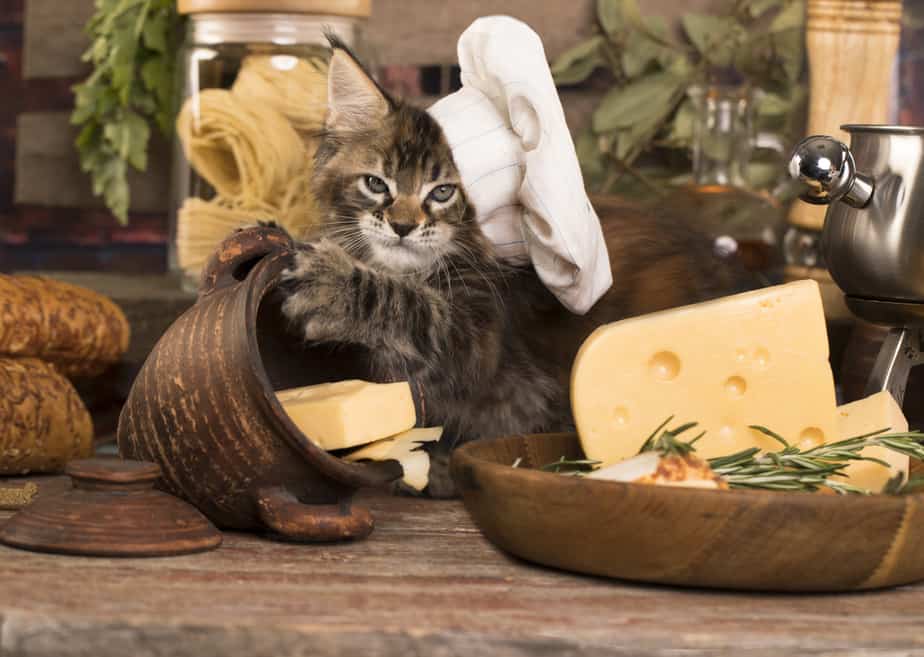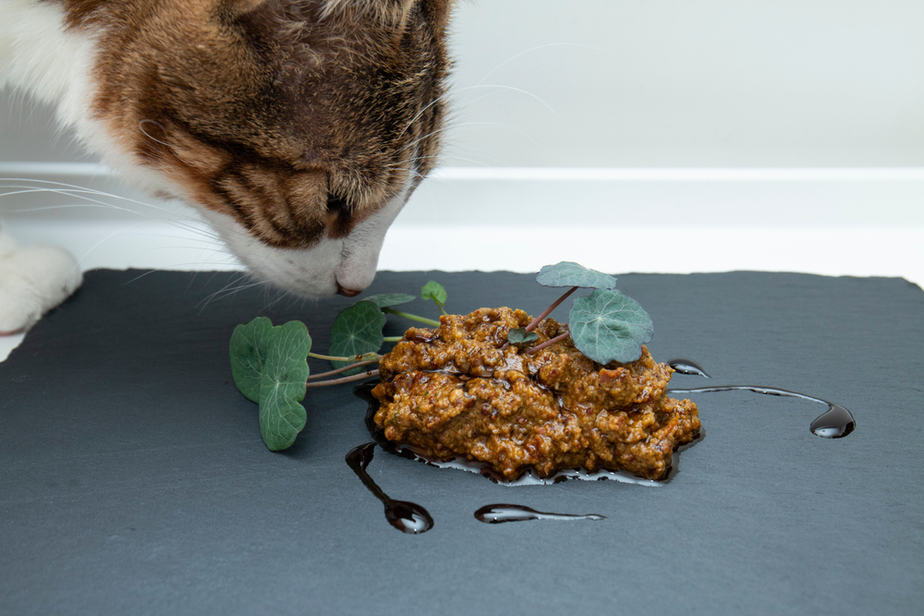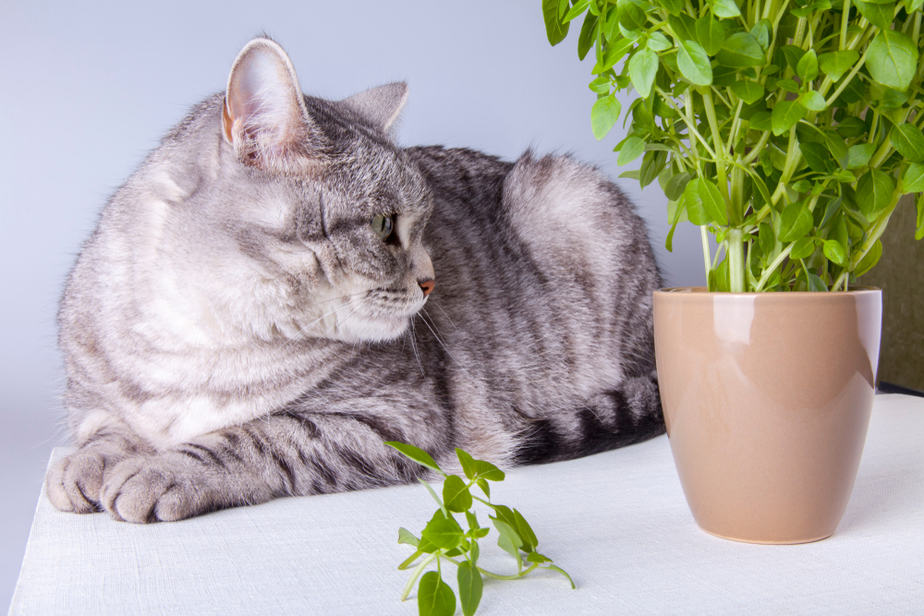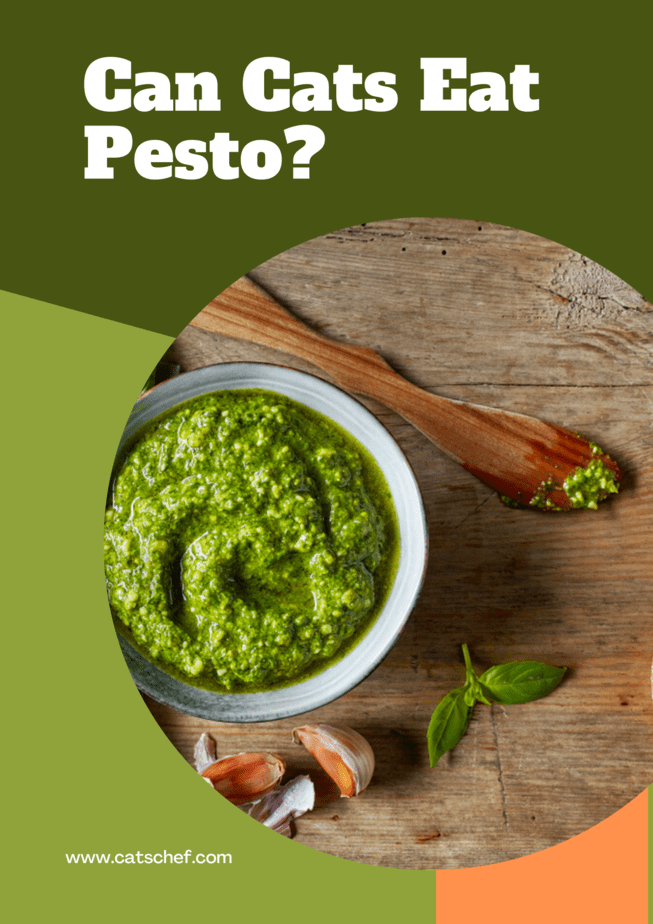📖 Table of Content:
Can cats eat pesto? This question might occur to you when eating a sandwich with this sauce, for instance. Or if your cat’s sitting right next to your pasta with some pesto on it. Her big, pleading eyes and begging meows might be tempting.
It’s hard to resist the soft touch of her paws, but you must. Cats can’t eat pesto because it contains certain ingredients that are harmful to them. If you find her stealing some of your food with this green sauce on, stop her immediately.
Pesto isn’t one of the foods that should be allowed for cats. Even small amounts of it can be damaging to your cat’s health. The usual combination that’s found in pesto is garlic, olive oil, Parmesan cheese, milk, basil, and pine nuts.
These ingredients can give your pet a hard time if ingested. Some are even toxic to felines. And apart from these main ingredients, pesto is full of spices that are bad for your cat. Let’s list some of the main ingredients and find out what makes pesto so harmful to cats.
What goes into pesto sauce?
This bright green sauce is originally from Italy. The word comes from a Genoese verb “pestare,” which means “to crush.” We don’t have to explain in detail how it’s done. Just think of all the things that can be crushed or blended.
When foods are crushed, it means more can fit in a jar, for instance. Pesto is one of those foods that look like they are just one ground ingredient. However, looks can be deceiving – there’s definitely more than meets the eye.
If something is good for humans, it doesn’t mean it has the same benefit to cats. Our four-legged companions have sensitive stomachs and the smallest changes can cause disturbance. Before introducing any new foods to your pet’s diet, make sure you talk it through with your vet.
1. Pine nuts
Pine nuts are also known as pignoli. These are edible seeds of pines and are rich in nutrients. Pine nuts are expensive and many people replace them with walnuts or almonds when making homemade pesto.
Pine nuts aren’t toxic to cats, or almonds and walnuts, for that matter. Yet, these nuts are high in fat, which could upset your cat’s stomach. Feeding pine nuts to cats can result in some unwanted symptoms, such as vomiting and diarrhea.
Pine nuts (and nuts in general) are also high in oils. These can have a similar effect on your cat as the fats contained in nuts.
Pine nuts can be a reason for concern. Felines are prone to allergies, just like humans. This includes nut allergy. If you notice any skin irritation in your cat after eating nuts, make sure to contact your vet.
2. Garlic
Unfortunately for cats, garlic is one of the main ingredients in pesto. It gives the sauce this unique flavor, but it can also wreak havoc in felines. Garlic is highly toxic to cats because of the chemicals it contains.
It’s about five times more toxic than onions. The chemicals found in garlic and onions can be found in every food from the Allium family. The culprits that make garlic so poisonous to cats are disulfide and thiosulphate.
These chemicals are known to damage red blood cells in felines. This can result in a health condition called anemia.
It’s unlikely your pet will try eating garlic on her own. The strong smell and taste aren’t what cats are usually attracted to. However, if she licked some of your pesto, you might want to look out for any signs of garlic poisoning.
These include some symptoms like vomiting, diarrhea, and lethargy. If your cat exhibits any of these after eating the sauce, make sure you take an emergency trip to the vet’s office.
3. Olive oil
You’re probably wondering if olive oil is safe for cats to eat. You’ve heard so many benefits of olive oil, that it must be good, right?
Unfortunately, oils aren’t recommended as a part of a cat’s diet. They aren’t poisonous to cats, although they can cause some undesirable consequences. If you must use oil in your cat’s diet, it’s best to use extra virgin olive oil.
Olive oil is the safest choice for your pet and can be consumed in small quantities. It’s rich in antioxidants and vitamin E. A tablespoon a day can have many benefits for your feline. Fuller and shinier coats, as well as a new source of energy are what organic olive oil might offer to cats.
But be warned. While olive oil isn’t toxic to cats, it can raise a ruckus in your cat’s body. It might give your kitty the runs, so it’s best to first consult with your vet before including it in your furchild’s diet.
4. Parmesan cheese and milk
Pesto contains a generous portion of cheese, usually Parmesan. Cats can eat small bites of cheese safely. Yet, any larger portions can disrupt their digestive system. The reason behind this is dairy.
Cheese is considered a dairy product because it’s made from milk. It’s a little-known fact that most cats are lactose intolerant. This means that cats can’t break down the sugar found in milk, also known as lactose.
Cats’ bodies are made for breaking down animal-derived proteins. The reason they can’t digest cheese and milk is because of evolution. It resulted in cats lacking the intestinal enzyme called lactase that breaks down lactose.
Sugar in milk is the reason your cat has to stay away from dairy products. If you wish to introduce milk to your pet, opt for some lactose-free milk. Introduce in small amounts to see how your cat reacts to it. Dairy products shouldn’t be a regular part of your feline’s diet anyway, though.
So, cheese and milk can give your pet a hard time when it comes to digesting. If she steals some pesto, the consequences of cheese and milk intake can result in vomiting and diarrhea.
5. What about basil? Is this herb dangerous?
No, basil isn’t dangerous to cats. Whether consumed in other foods or on its own, it’s perfectly safe for your pet. No side effects have been reported and moreover, adding basil to cat food can help spark up your cat’s appetite.
This herb is what gives this sauce its bright green color. A little bit of basil in your cat’s food can be beneficial to cats. Basil is an antioxidant, which helps prevent cell damage. It also decreases the risk of many health conditions, such as diabetes and cancer.
Cats are picky eaters and this herb helps will enhance the taste and smell of foods. Although it doesn’t hold any nutritional value to cats, basil can’t harm your pet. So, this ingredient found in pesto isn’t the one you should worry about.
6. Other herbs and spices
The short answer is no. Your cat can’t eat spices because they’re harmful to her. Any additional seasonings and spices can cause problems in your cat’s stomach. Her body isn’t made for digesting these added flavors.
Shockingly, cats are pretty simple creatures. They rely mostly on protein and any extra supplements can be detrimental to their health. The same goes for spices in this green sauce.
For example, the above-mentioned basil is perfectly safe for cats. However, the salt content found in this sauce is something to worry about.
Cats can manage only small amounts of salt – any more and it becomes poisonous to them. Sodium toxicity occurs if your pet has ingested excessive amounts.
One of the symptoms of salt toxicity is dehydration. If you notice your pet excessively drinking water or urinating, it’s possible she’s been salt intoxicated.
Another popular herb used for making pesto is oregano. While this herb isn’t toxic to cats, it may cause some gastrointestinal problems. Apart from vomiting and diarrhea, too much of this herb could easily cause liver damage in cats.
Now, realistically speaking, the amount of these spices in a few licks of pesto isn’t likely to harm your cat. Still, it’s best if you abstain from feeding your cat pesto.
Read more: Can Cats Eat Ranch? Will It Cause A Tummy Avalanche?
Final thoughts
To clarify whether cats can and should eat pesto, we have provided you with some crucial information. Some of the main ingredients are toxic to your cat, such as garlic and salt. Other ingredients can cause gastrointestinal upset, such as cheese and pine nuts.
A few of the ingredients can be consumed safely, in moderation. Some of these include olive oil and basil. All in all, not many of the ingredients found in pesto are safe for your pet. We know it can be hard denying their wishes, but it’s for their sake.
Cats are sensitive creatures and any new foods can cause some gastrointestinal disturbance. Make sure you stick with your pet’s regular, feline-appropriate diet to keep her in optimal health.
Keep your pesto sealed away tightly and gulp down any pasta with this sauce on before her toe beans try to swipe a sample! Don’t share this green sauce with your felines as it doesn’t have any nutrients that can benefit your pets.
Read more: Can Cats Eat Soy Sauce? Good Or Bad Choice?
